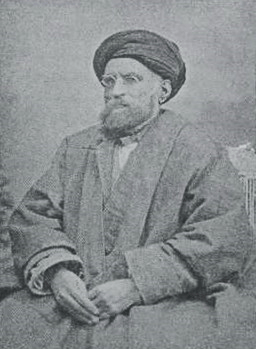Adib Pishavari facts for kids
Quick facts for kids Adib Pishavari |
|
|---|---|
| ادیب پیشاوری | |

Pishavari, c. 1910s–1920s
|
|
| Religion | Shia Islam |
| Denomination | Twelver |
| Lineage | Shihab al-Din 'Umar al-Suhrawardi |
| Philosophy | Adab and hikmah |
| Known for | Criticizing British foreign policy in the Middle East (see "old fox") |
| Personal | |
| Born | 1844 Peshawar, Sikh Empire |
| Died | 30 June 1930 (aged 85–86) Tehran, Pahlavi Iran |
| Resting place | Imamzadeh Abdollah, Tehran |
| Senior posting | |
| Based in |
|
Seyyed Ahmad Adib Pishavari (Persian: ادیب پیشاوری), born in 1844 and passed away in 1930, was a very smart scholar and poet. He was born near Peshawar, which is now in Pakistan. Adib Pishavari was a master of Persian literature, meaning he was excellent at writing and understanding Persian books and poems.
When Adib was young, his family faced tough times. His father and many relatives died during conflicts between the British and Afghan tribes. Because of this, Adib moved to Kabul and later Ghazni to continue his studies. In 1877, he moved to Iran. There, he joined a special school called a madrasa in Sabzevar. He learned advanced ideas from a famous teacher, Molla Hadi Sabzevari.
Adib Pishavari strongly disagreed with British policies in Iran and the surrounding areas. He called these policies "evil." In his writings, he often compared the United Kingdom to an "old fox," an "ominous raven," and a "venomous viper."
Early Life and Learning
Adib Pishavari was born in 1844. Some say he was born in a mountain village between Afghanistan and Peshawar. Others believe he was born right in Peshawar. His father, Seyyed Shah Baba, came from a noble family of Sufi scholars.
After his father died, Adib moved to Kabul. Then he went to Ghaznin. In these cities, he learned about good manners (called etiquette) and deep wisdom (called hikmah).
Adib later traveled to Mashhad to finish his education. For his last two years of schooling, he studied with Hadi Sabzavari in Sabzevar. In 1921, Adib moved to Tehran. This move was suggested by Saeed Khan Garmroudi, a foreign minister from Iran. Adib Pishavari never got married. He stayed in Tehran until he passed away in 1930. He was buried in Ray, Iran.
His Writings and Ideas
Adib Pishavari was a very important writer of his time. He knew a lot about many subjects. He was also very good at both Persian and Arabic languages. He had an amazing memory.
His collection of poems has about 20,000 lines. This collection was published three years after he died. It includes many ghazals (love poems) and qasidas (long poems). It has 370 lines in Arabic and 4,200 lines in Persian.
Adib also wrote a long poem called Qaysarnama. This poem honored Kaiser Wilhelm II and praised Germany's role in World War I. Even though Adib was an older poet, he liked new social and political ideas. He helped Persian poetry become more about national pride.
Adib's father and many relatives died during wars between British forces and Afghan tribes. Because of this, Adib strongly criticized British policies. He called them "evil." In his writings, he compared the United Kingdom to animals. He used phrases like "old fox," "ominous raven," and "venomous viper." The nickname "old fox" for the UK is still popular in Iran today.
One of Adib's poems shows his feelings:
Many an ancient house
Was razed after you crept in
You seized lands through your fox games
You have escaped hundred of traps, like an old fox—Adib Pishavari
See also

